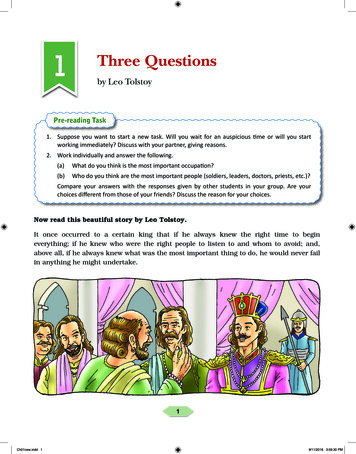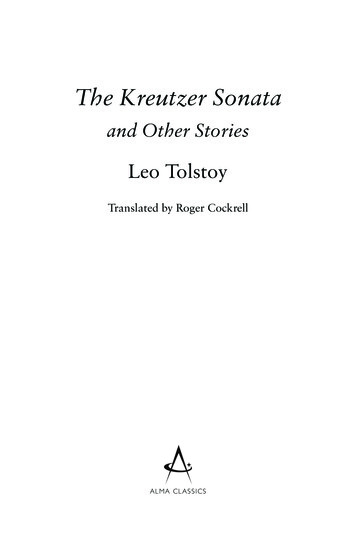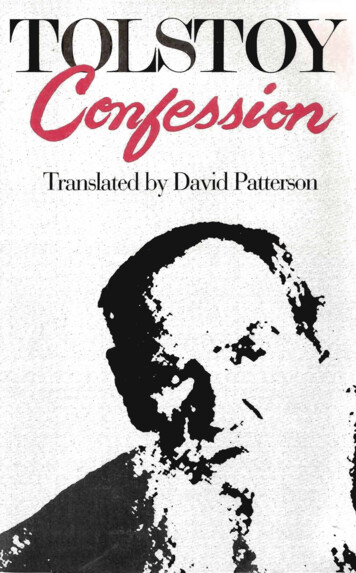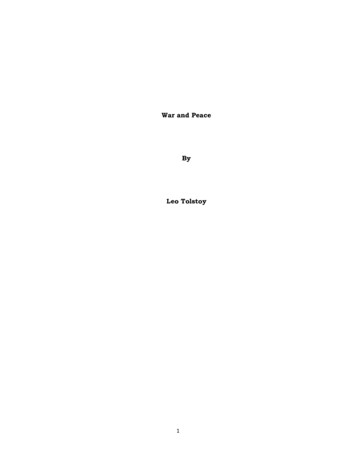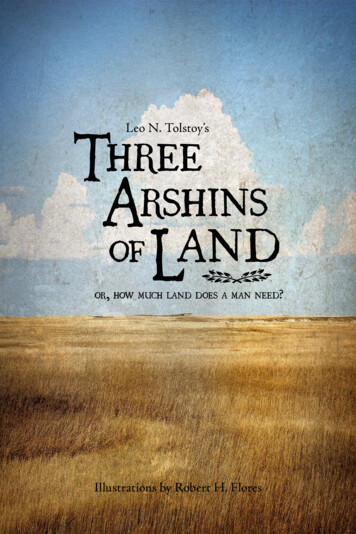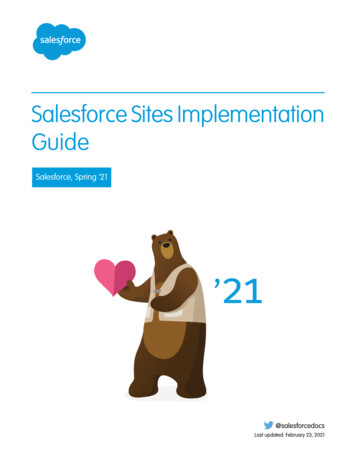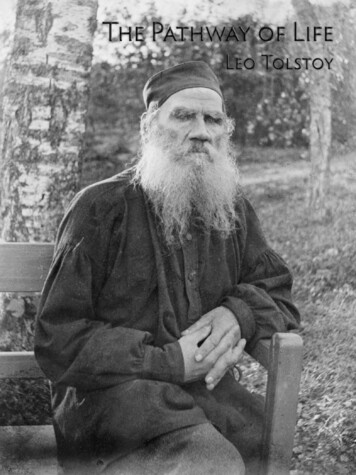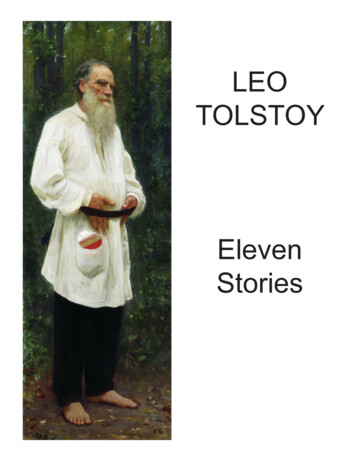
Transcription
LEOTOLSTOYElevenStories
CONTENTSTHREE QUESTIONS -- 1HOW MUCH LAND DOES A MAN NEED? -- 5THE CANDLE -- 6GOD SEES THE TRUTH, BUT WAITS -- 11THE COFFEE HOUSE OF SURAT --15THE GRAIN AS BIG AS A HEN’S EGG -- 19LITTLE GIRLS WISER THAN MEN -- 21ESARHADDON, KING OF ASSYRIA -- 22WHERE LOVE IS, GOD IS -- 25TOO DEAR! -- 29A SPARK NEGLECTED -- 32peaceCENTER, 1443 S. St. Mary’s, San Antonio, TX 78210www.salsa.net/peace 210.224.HOPE pcebooks@yahoo.com
Three Questionsby Leo TolstoyOne day it occurred to a certain emperor that ifhe only knew the answers to three questions, he wouldnever stray in any matter.What is the best time to do each thing? Whoare the most important people to work with? What isthe most important thing to do at all times?The emperor issued a decree throughout hiskingdom announcing that whoever could answer thequestions would receive a great reward. Many who readthe decree made their way to the palace at once, eachperson with a different answer.In reply to the first question, one person advisedthat the emperor make up a thorough time schedule,consecrating every hour, day, month, and year forcertain tasks and then follow the schedule to the letter.Only then could he hope to do every task at the righttime.Another person replied that it was impossibleto plan in advance and that the emperor should putall vain amusements aside and remain attentive toeverything in order to know what to do at what time.Someone else insisted that, by himself, theemperor could never hope to have all the foresight andcompetence necessary to decide when to do each andevery task and what he really needed was to set up aCouncil of the Wise and then to act according to theiradvice.Someone else said that certain matters requiredimmediate decision and could not wait for consultation,but if he wanted to know in advance what was going tohappen he should consult magicians and soothsayers.The responses to the second question alsolacked accord.One person said that the emperor neededto place all his trust in administrators, anotherurged reliance on priests and monks, while othersrecommended physicians. Still others put their faith inwarriors.The third question drew a similar variety ofanswers. Some said science was the most importantpursuit. Others insisted on religion. Yet others claimedthe most important thing was military skill.The emperor was not pleased with any of theanswers, and no reward was given.After several nights of reflection, the emperorresolved to visit a hermit who lived up on the mountainand was said to be an enlightened man. The emperorwished to find the hermit to ask him the three questions,though he knew the hermit never left the mountainsand was known to receive only the poor, refusing tohave anything to do with persons of wealth or power.So the emperor disguised himself as a simple peasantand ordered his attendants to wait for him at the foot ofthe mountain while he climbed the slope alone to seekthe hermit.Reaching the holy man’s dwelling place, theemperor found the hermit digging a garden in front ofhis hut. When the hermit saw the stranger, he noddedhis head in greeting and continued to dig. The laborwas obviously hard on him. He was an old man, andeach time he thrust his spade into the ground to turnthe earth, he heaved heavily.The emperor approached him and said, “Ihave come here to ask your help with three questions:When is the best time to do each thing? Who are themost important people to work with? What is the mostimportant thing to do at all times?”The hermit listened attentively but only pattedthe emperor on the shoulder and continued digging.The emperor said, “You must be tired. Here, let megive you a hand with that.” The hermit thanked him,handed the emperor the spade, and then sat down onthe ground to rest.After he had dug two rows, the emperorstopped and turned to the hermit and repeated histhree questions. The hermit still did not answer, butinstead stood up and pointed to the spade and said,“Why don’t you rest now? I can take over again.” But theemperor continued to dig. One hour passed, then two.Finally the sun began to set behind the mountain. Theemperor put down the spade and said to the hermit, “Icame here to ask if you could answer my three questions.But if you can’t give me any answer, please let me knowso that I can get on may way home.”The hermit lifted his head and asked theemperor, “Do you hear someone running over there?”1
The emperor turned his head. They both saw a manwith a long white beard emerge from the woods. Heran wildly, pressing his hands against a bloody woundin his stomach. The man ran toward the emperorbefore falling unconscious to the ground, where he laygroaning. Opening the man’s clothing, the emperor andhermit saw that the man had received a deep gash. Theemperor cleaned the wound thoroughly and then usedhis own shirt to bandage it, but the blood completelysoaked it within minutes. He rinsed the shirt out andbandaged the wound a second time and continued todo so until the flow of blood had stopped.At last the wounded man regained consciousnessand asked for a drink of water. The emperor ran downto the stream and brought back a jug of fresh water.Meanwhile, the sun had disappeared and the night airhad begun to turn cold. The hermit gave the emperor ahand in carrying the man into the hut where they laidhim down on the hermit’s bed. The man closed his eyesand lay quietly.The emperor was worn out from the long dayof climbing the mountain and digging the garden.Leaning against the doorway, he fell asleep. When herose, the sun had already risen over the mountain. Fora moment he forgot where he was and what he hadcome here for. He looked over to the bed and saw thewounded man also looking around him in confusion.When he saw the emperor, he stared at him intentlyand then said in a faint whisper, “Please forgive me.”“But what have you done that I should forgiveyou?” the emperor asked.“You do not know me, your majesty, but I knowyou. I was your sworn enemy, and I had vowed to takevengeance on you, for during the last war you killed mybrother and seized my property. When I learned thatyou were coming alone to the mountain to meet thehermit, I resolved to surprise you on your way back tokill you. But after waiting a long time there was still nosign of you, and so I left my ambush in order to seekyou out. But instead of finding you, I came across yourattendants, who recognized me, giving me this wound.Luckily, I escaped and ran here. If I hadn’t met you Iwould surely be dead by now. I had intended to killyou, but instead you saved my life! I am ashamed andgrateful beyond words. If I live, I vow to be your servantfor the rest of my life, and I will bid my children andgrandchildren to do the same. Please grant me yourforgiveness.”2The emperor was overjoyed to see that he wasso easily reconciled with a former enemy. He not onlyforgave the man but promised to return all the man’sproperty and to send his own physician and servants towait on the man until he was completely healed. Afterordering his attendants to take the man home, theemperor returned to see the hermit. Before returningto the palace the emperor wanted to repeat his threequestions one last time. He found the hermit sowingseeds in the earth they had dug the day before.The hermit stood up and looked at the emperor.“But your questions have already been answered.”“How’s that?” the emperor asked, puzzled.“Yesterday, if you had not taken pity on my ageand given me a hand with digging these beds, you wouldhave been attacked by that man on your way home.Then you would have deeply regretted not stayingwith me. Therefore the most important time was thetime you were digging in the beds, the most importantperson was myself, and the most important pursuitwas to help me. Later, when the wounded man ran uphere, the most important time was the time you spentdressing his wound, for if you had not cared for him hewould have died and you would have lost the chanceto be reconciled with him. Likewise, he was the mostimportant person, and the most important pursuit wastaking care of his wound. Remember that there is onlyone important time and is Now. The present moment isthe only time over which we have dominion. The mostimportant person is always the person with whom youare, who is right before you, for who knows if you willhave dealings with any other person in the future. Themost important pursuit is making that person, the onestanding at you side, happy, for that alone is the pursuitof life.”
HOW MUCH LAND DOES A MAN NEED?by Leo TolstoyThe ambitious peasant Pakhom, who, aftergaining ever greater plots of land, finally heard of awonderful deal in a far-off country. He travelled to theland of the Bashkirs and negotiated with the villageelder, who seemed a fool. The elder told Pakhom thathe could have all the land he wanted for a thousandrubles a day.Pakhom did not understand. “What kind ofrate is that - a day?” he asked. “How many acres couldthat be?”“We don’t reckon your way. We sell by the day. Howevermuch you can walk around in one day will be yours.”When Pakhon expressed that a man can walkaround much land in one day, the elder burst outlaughing. “And all of it will be yours!” he replied. Butthere was one condition: If Pakhom didn’t return tothe starting point by sundown, the money would beforfeited.Ecstatic, Pakhom spent a sleepless night. Risingat dawn, he went with the villagers to the top of a hillwhere the elder put down his hat. After placing histhousand rubles on top, Pakhom began walking, diggingholes along the way to mark his land. The going waseasy and he thought,”I’ll do another three miles andthen turn left. The land’s so beautiful here, it would bea pity to miss any.”Pakhom hurried throughout the morning,going out of his way to add more land. But at noonwhen he looked back at the hill where he had began, itwas difficult to see the people. Maybe I have gone toofar, he worried, and decided he must begin to makeshorter sides. As the afternoon wore on, the heat wasexhausting. By now his bare feet were cut and bruished,and his legs weakened. He wanted to rest, but it was outof question.Pakhom struggled on, walking faster, thenrunning. He worried that he had been too greedy andhis fear made him breathless. On he ran, his shirt soakedand his throat parched. His lungs were working like ablacksmith’s bellows, his heart beat like a hammer. Hewas terrified.All these strain will be the death of me.Although Pakhom feared death, he couldn’tstop. They’d call me an idiot, he thought. When hewas close enough to hear the Bashkirs cheering, hesummoned his last ounce of strength and kept running.As he finally reached the hill, everything suddenlybecame dark—the sun had set. Pakhom groaned. Hewanted to stop, but heard the Bashkirs still cheeringhim on. He realized that from where he was at thebottom of the hill, the sun had set - but not for thoseon top. Pakhom took a deep breath and rushed up thehill. Reaching the top, he saw the elder sitting by thehat, laughing his head off. Pakhom’s legs gave way, andhe fell forward grasping the cap.“Oh well done,” exclaimed the elder.“That’s a lot of land you’ve earned yourself!”Pakhom’s worker ran up and tried to lift hismaster, but Pakhom was dead. The worker picked upPakhom’s spade, dug a grave, and buried him - six feetfrom head to heel, exactly the amount of land a manneeds.3
THE CANDLEby Leo Tolstoy“Ye have heard that it hath been said, an eye for an eye and atooth for a tooth: but I say unto you, That ye resist not evil.”-ST. MATTHEW V. 38, 39.It was in the time of serfdom--many years beforeAlexander II.’s liberation of the sixty million serfs in1862. In those days the people were ruled by differentkinds of lords. There were not a few who, rememberingGod, treated their slaves in a humane manner, and notas beasts of burden, while there were others who wereseldom known to perform a kind or generous action;but the most barbarous and tyrannical of all werethose former serfs who arose from the dirt and becameprinces.It was this latter class who made life literally aburden to those who were unfortunate enough to comeunder their rule. Many of them had arisen from theranks of the peasantry to become superintendents ofnoblemen’s estates.The peasants were obliged to work for theirmaster a certain number of days each week. Therewas plenty of land and water and the soil was rich andfertile, while the meadows and forests were sufficient tosupply the needs of both the peasants and their lord.There was a certain nobleman who had chosena superintendent from the peasantry on one of his otherestates. No sooner had the power to govern been vestedin this newly-made official than he began to practice themost outrageous cruelties upon the poor serfs who hadbeen placed under his control. Although this man hada wife and two married daughters, and was making somuch money that he could have lived happily withouttransgressing in any way against either God or man, yethe was filled with envy and jealousy and deeply sunk insin.Michael Simeonovitch began his persecutionsby compelling the peasants to perform more days ofservice on the estate every week than the laws obligedthem to work. He established a brick-yard, in which heforced the men and women to do excessive labor, sellingthe bricks for his own profit.4On one occasion the overworked serfs sent adelegation to Moscow to complain of their treatment totheir lord, but they obtained no satisfaction. When thepoor peasants returned disconsolate from the noblemantheir superintendent determined to have revenge fortheir boldness in going above him for redress, and theirlife and that of their fellow-victims became worse thanbefore.It happened that among the serfs there weresome very treacherous people who would falsely accusetheir fellows of wrong-doing and sow seeds of discordamong the peasantry, whereupon Michael wouldbecome greatly enraged, while his poor subjects beganto live in fear of their lives. When the superintendentpassed through the village the people would run andhide themselves as from a wild beast. Seeing thus theterror which he had struck to the hearts of the moujiks,Michael’s treatment of them became still morevindictive, so that from over-work and ill-usage the lotof the poor serfs was indeed a hard one.There was a time when it was possible for thepeasants, when driven to despair, to devise meanswhereby they could rid themselves of an inhumanmonster such as Simeonovitch, and so these unfortunatepeople began to consider whether something could notbe done to relieve THEM of their intolerable yoke. Theywould hold little meetings in secret places to bewailtheir misery and to confer with one another as to whichwould be the best way to act. Now and then the boldestof the gathering would rise and address his companionsin this strain: “How much longer can we tolerate such avillain to rule over us? Let us make an end of it at once,for it were better for us to perish than to suffer. It issurely not a sin to kill such a devil in human form.”It happened once, before the Easter holidays,that one of these meetings was held in the woods,where Michael had sent the serfs to make a clearancefor their master. At noon they assembled to eat theirdinner and to hold a consultation. “Why can’t weleave now?” said one. “Very soon we shall be reducedto nothing. Already we are almost worked to death-there being no rest, night or day, either for us or ourpoor women. If anything should be done in a way not
exactly to please him he will find fault and perhaps flogsome of us to death--as was the case with poor Simeon,whom he killed not long ago. Only recently Anisim wastortured in irons till he died. We certainly cannot standthis much longer.” “Yes,” said another, “what is the useof waiting? Let us act at once. Michael will be here thisevening, and will be certain to abuse us shamefully. Letus, then, thrust him from his horse and with one blowof an axe give him what he deserves, and thus end ourmisery. We can then dig a big hole and bury him like adog, and no one will know what became of him. Nowlet us come to an agreement--to stand together as oneman and not to betray one another.”The last speaker was Vasili Minayeff, who,if possible, had more cause to complain of Michael’scruelty than any of his fellow-serfs. The superintendentwas in the habit of flogging him severely every week,and he took also Vasili’s wife to serve him as cook.Accordingly, during the evening that followedthis meeting in the woods Michael arrived on the sceneon horseback. He began at once to find fault with themanner in which the work had been done, and tocomplain because some lime-trees had been cut down.“I told you not to cut down any lime-trees!”shouted the enraged superintendent. “Who did thisthing? Tell me at once, or I shall flog every one ofyou!”On investigation, a peasant named Sidor waspointed out as the guilty one, and his face was roundlyslapped. Michael also severely punished Vasili, becausehe had not done sufficient work, after which the masterrode safely home.In the evening the serfs again assembled, andpoor Vasili said: “Oh, what kind of people ARE we,anyway? We are only sparrows, and not men at all! Weagree to stand by each other, but as soon as the timefor action comes we all run and hide. Once a lot ofsparrows conspired against a hawk, but no sooner didthe bird of prey appear than they sneaked off in thegrass. Selecting one of the choicest sparrows, the hawktook it away to eat, after which the others came outcrying, ‘Twee-twee!’ and found that one was missing.‘Who is killed?’ they asked. ‘Vanka! Well, he deservedit.’ You, my friends, are acting in just the same manner.When Michael attacked Sidor you should have stoodby your promise. Why didn’t you arise, and with onestroke put an end to him and to our misery?”The effect of this speech was to make thepeasants more firm in their determination to kill theirsuperintendent. The latter had already given ordersthat they should be ready to plough during the Easterholidays, and to sow the field with oats, whereupon theserfs became stricken with grief, and gathered in Vasili’shouse to hold another indignation meeting. “If he hasreally forgotten God,” they said, “and shall continue tocommit such crimes against us, it is truly necessary thatwe should kill him. If not, let us perish, for it can makeno difference to us now.”This despairing programme, however, met withconsiderable opposition from a peaceably-inclined mannamed Peter Mikhayeff. “Brethren,” said he, “you arecontemplating a grievous sin. The taking of humanlife is a very serious matter. Of course it is easy to endthe mortal existence of a man, but what will becomeof the souls of those who commit the deed? If Michaelcontinues to act toward us unjustly God will surelypunish him. But, my friends, we must have patience.”This pacific utterance only served to intensifythe anger of Vasili. Said he: “Peter is forever repeatingthe same old story, ‘It is a sin to kill any one.’ Certainlyit is sinful to murder; but we should consider the kindof man we are dealing with. We all know it is wrong tokill a good man, but even God would take away the lifeof such a dog as he is. It is our duty, if we have any lovefor mankind, to shoot a dog that is mad. It is a sin tolet him live. If, therefore, we are to suffer at all, let it bein the interests of the people--and they will thank us forit. If we remain quiet any longer a flogging will be ouronly reward. You are talking nonsense, Mikhayeff. Whydon’t you think of the sin we shall be committing if wework during the Easter holidays--for you will refuse towork then yourself?”“Well, then,” replied Peter, “if they shall sendme to plough, I will go. But I shall not be going of myown free will, and God will know whose sin it is, andshall punish the offender accordingly. Yet we mustnot forget him. Brethren, I am not giving you my ownviews only. The law of God is not to return evil for evil;indeed, if you try in this way to stamp out wickednessit will come upon you all the stronger. It is not difficultfor you to kill the man, but his blood will surely stainyour own soul. You may think you have killed a badman--that you have gotten rid of evil--but you will soonfind out that the seeds of still greater wickedness havebeen planted within you. If you yield to misfortune itwill surely come to you.”5
As Peter was not without sympathizers amongthe peasants, the poor serfs were consequently dividedinto two groups: the followers of Vasili and those whoheld the views of Mikhayeff.On Easter Sunday no work was done. Towardthe evening an elder came to the peasants from thenobleman’s court and said: “Our superintendent,Michael Simeonovitch, orders you to go to-morrow toplough the field for the oats.” Thus the official wentthrough the village and directed the men to prepare forwork the next day--some by the river and others by theroadway. The poor people were almost overcome withgrief, many of them shedding tears, but none dared todisobey the orders of their master.On the morning of Easter Monday, while thechurch bells were calling the inhabitants to religiousservices, and while every one else was about to enjoya holiday, the unfortunate serfs started for the field toplough. Michael arose rather late and took a walk aboutthe farm. The domestic servants were through with theirwork and had dressed themselves for the day, whileMichael’s wife and their widowed daughter (who wasvisiting them, as was her custom on holidays) had beento church and returned. A steaming samovar awaitedthem, and they began to drink tea with Michael, who,after lighting his pipe, called the elder to him.“Well,” said the superintendent, “have youordered the moujiks to plough to-day?”“Yes, sir, I did,” was the reply.“Have they all gone to the field?”“Yes, sir; all of them. I directed them myselfwhere to begin.”“That is all very well. You gave the orders, butare they ploughing? Go at once and see, and you maytell them that I shall be there after dinner. I shall expectto find one and a half acres done for every two ploughs,and the work must be well done; otherwise they shall beseverely punished, notwithstanding the holiday.”“I hear, sir, and obey.”The elder started to go, but Michael called himback. After hesitating for some time, as if he felt veryuneasy, he said:“By the way, listen to what those scoundrelssay about me. Doubtless some of them will curse me,and I want you to report the exact words. I know whatvillains they are. They don’t find work at all pleasant.They would rather lie down all day and do nothing.6They would like to eat and drink and make merry onholidays, but they forget that if the ploughing is notdone it will soon be too late. So you go and listen towhat is said, and tell it to me in detail. Go at once.”“I hear, sir, and obey.”Turning his back and mounting his horse, theelder was soon at the field where the serfs were hard atwork.It happened that Michael’s wife, a very good-heartedwoman, overheard the conversation which her husbandhad just been holding with the elder. Approaching him,she said:“My good friend, Mishinka [diminutive ofMichael], I beg of you to consider the importance andsolemnity of this holy-day. Do not sin, for Christ’s sake.Let the poor moujiks go home.”Michael laughed, but made no reply to his wife’shumane request. Finally he said to her:“You’ve not been whipped for a very long time,and now you have become bold enough to interfere inaffairs that are not your own.”“Mishinka,” she persisted, “I have had a frightfuldream concerning you. You had better let the moujiksgo.”“Yes,” said he; “I perceive that you have gainedso much flesh of late that you think you would not feelthe whip. Lookout!”Rudely thrusting his hot pipe against her cheek,Michael chased his wife from the room, after which heordered his dinner. After eating a hearty meal consistingof cabbage-soup, roast pig, meat-cake, pastry with milk,jelly, sweet cakes, and vodki, he called his woman cookto him and ordered her to be seated and sing songs,Simeonovitch accompanying her on the guitar.While the superintendent was thus enjoying himselfto the fullest satisfaction in the musical society of hiscook the elder returned, and, making a low bow to hissuperior, proceeded to give the desired informationconcerning the serfs.“Well,” asked Michael, “did they plough?”“Yes,” replied the elder; “they have accomplishedabout half the field.”“Is there no fault to be found?”“Not that I could discover. The work seems tobe well done. They are evidently afraid of you.”
“How is the soil?”“Very good. It appears to be quite soft.”“Well,” said Simeonovitch, after a pause, “whatdid they say about me? Cursed me, I suppose?”As the elder hesitated somewhat, Michaelcommanded him to speak and tell him the wholetruth. “Tell me all,” said he; “I want to know their exactwords. If you tell me the truth I shall reward you; butif you conceal anything from me you will be punished.See here, Catherine, pour out a glass of vodki to givehim courage!”After drinking to the health of his superior, the eldersaid to himself: “It is not my fault if they do not praisehim. I shall tell him the truth.” Then turning suddenlyto the superintendent he said:“They complain, Michael Simeonovitch! Theycomplain bitterly.”“But what did they say?” demanded Michael.“Tell me!”“Well, one thing they said was, ‘He does notbelieve in God.’”Michael laughed. “Who said that?” he asked.“It seemed to be their unanimous opinion. ‘Hehas been overcome by the Evil One,’ they said.”“Very good,” laughed the superintendent; “buttell me what each of them said. What did Vasili say?”The elder did not wish to betray his people, buthe had a certain grudge against Vasili, and he said:“He cursed you more than did any of theothers.”“But what did he say?”“It is awful to repeat it, sir. Vasili said, ‘He shalldie like a dog, having no chance to repent!’”“Oh, the villain!” exclaimed Michael. “He wouldkill me if he were not afraid. All right, Vasili; we shallhave an accounting with you. And Tishka--he called mea dog, I suppose?”“Well,” said the elder, “they all spoke of you inanything but complimentary terms; but it is mean inme to repeat what they said.”“Mean or not you must tell me, I say!”“Some of them declared that your back shouldbe broken.”Simeonovitch appeared to enjoy this immensely,for he laughed outright. “We shall see whose back willbe the first to be broken,” said he. “Was that Tishka’sopinion? While I did not suppose they would sayanything good about me, I did not expect such cursesand threats. And Peter Mikhayeff--was that fool cursingme too?”“No; he did not curse you at all. He appeared tobe the only silent one among them. Mikhayeff is a verywise moujik, and he surprises me very much. At hisactions all the other peasants seemed amazed.”“What did he do?”“He did something remarkable. He wasdiligently ploughing, and as I approached him I heardsome one singing very sweetly. Looking between theploughshares, I observed a bright object shining.”“Well, what was it? Hurry up!”“It was a small, five-kopeck wax candle, burningbrightly, and the wind was unable to blow it out.Peter, wearing a new shirt, sang beautiful hymns as heploughed, and no matter how he handled the implementthe candle continued to burn. In my presence he fixedthe plough, shaking it violently, but the bright littleobject between the colters remained undisturbed.”“And what did Mikhayeff say?”“He said nothing--except when, on seeing me,he gave me the holy-day salutation, after which he wenton his way singing and ploughing as before. I did notsay anything to him, but, on approaching the othermoujiks, I found that they were laughing and makingsport of their silent companion. ‘It is a great sin toplough on Easter Monday,’ they said. ‘You could notget absolution from your sin if you were to pray all yourlife.’”“And did Mikhayeff make no reply?”“He stood long enough to say: ‘There should bepeace on earth and good-will to men,’ after which heresumed his ploughing and singing, the candle burningeven more brightly than before.”Simeonovitch had now ceased to ridicule, and, puttingaside his guitar, his head dropped on his breast and hebecame lost in thought. Presently he ordered the elderand cook to depart, after which Michael went behind ascreen and threw himself upon the bed. He was sighingand moaning, as if in great distress, when his wife camein and spoke kindly to him. He refused to listen to her,exclaiming:“He has conquered me, and my end is near!”“Mishinka,” said the woman, “arise and goto the moujiks in the field. Let them go home, and7
everything will be all right. Heretofore you have run fargreater risks without any fear, but now you appear to bevery much alarmed.”“He has conquered me!” he repeated. “I amlost!”“What do you mean?” demanded his wife,angrily. “If you will go and do as I tell you there will beno danger. Come, Mishinka,” she added, tenderly; “Ishall have the saddle-horse brought for you at once.”When the horse arrived the woman persuadedher husband to mount the animal, and to fulfil herrequest concerning the serfs. When he reached thevillage a woman opened the gate for him to enter,and as he did so the inhabitants, seeing the brutalsuperintendent whom everybody feared, ran to hidethemselves in their houses, gardens, and other secludedplaces.At length Michael reached the other gate,which he found closed also, and, being unable to openit himself while seated on his horse, he called loudlyfor assistance. As no one responded to his shouts hedismounted and opened the gate, but as he was aboutto remount, and had one foot in the stirrup, the horsebecame frightened at some pigs and sprang suddenly toone side. The superintendent fell across the fence anda very sharp picket pierced his stomach, when Michael8fell unconscious to the ground.Toward the evening, when the serfs arrived atthe village gate, their horses refused to enter. On looking
by Leo Tolstoy. 2 The emperor turned his head. They both saw a man with a long white beard emerge from the woods. He ran wildly, pressing his hands against a bloody wound in his stomach. The man ran toward the emperor before falling unconscious to the ground, where he


